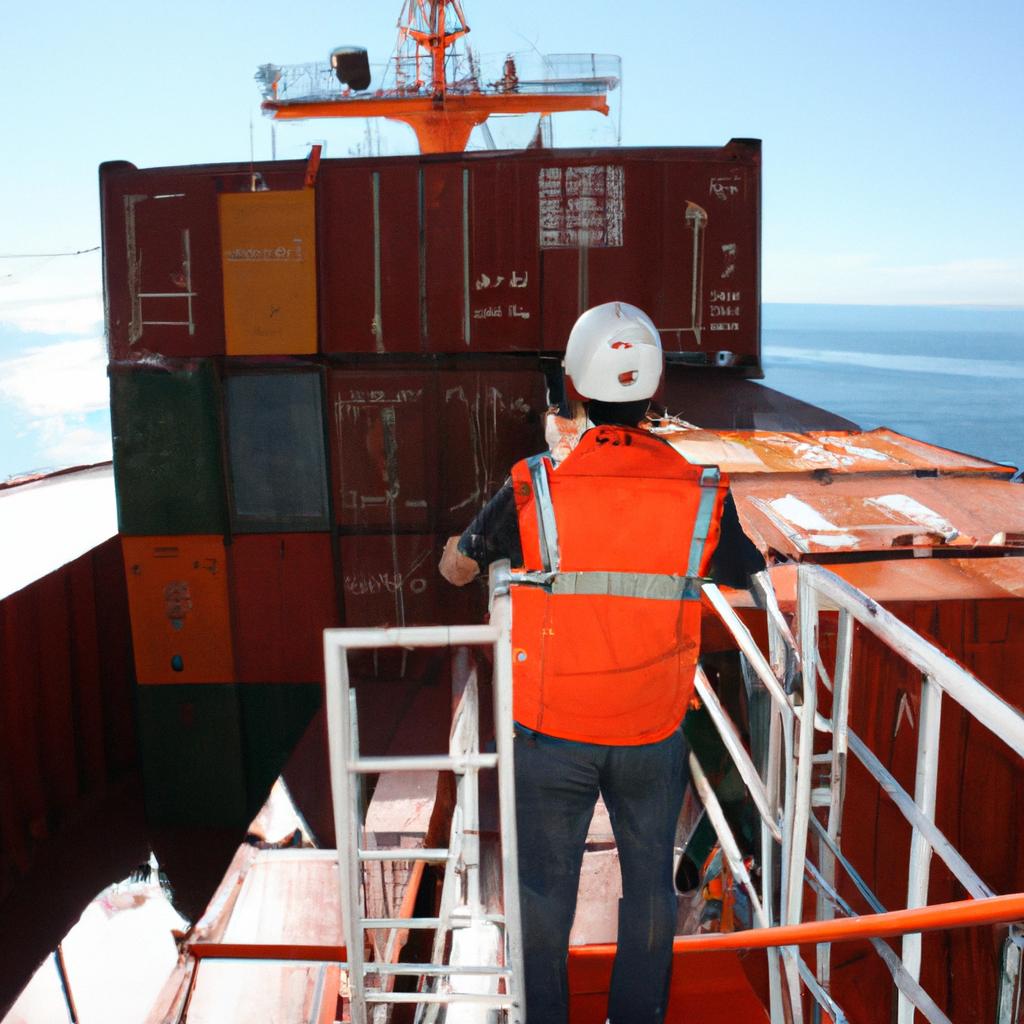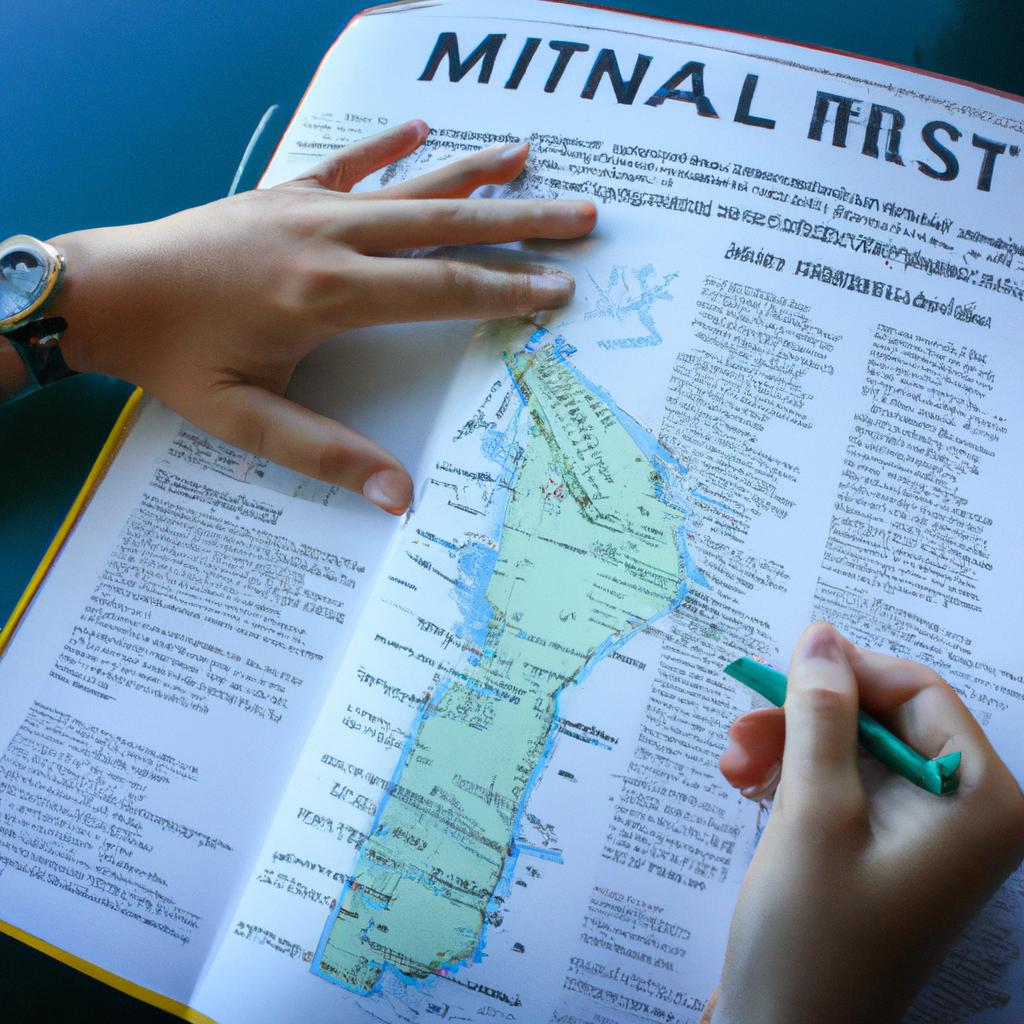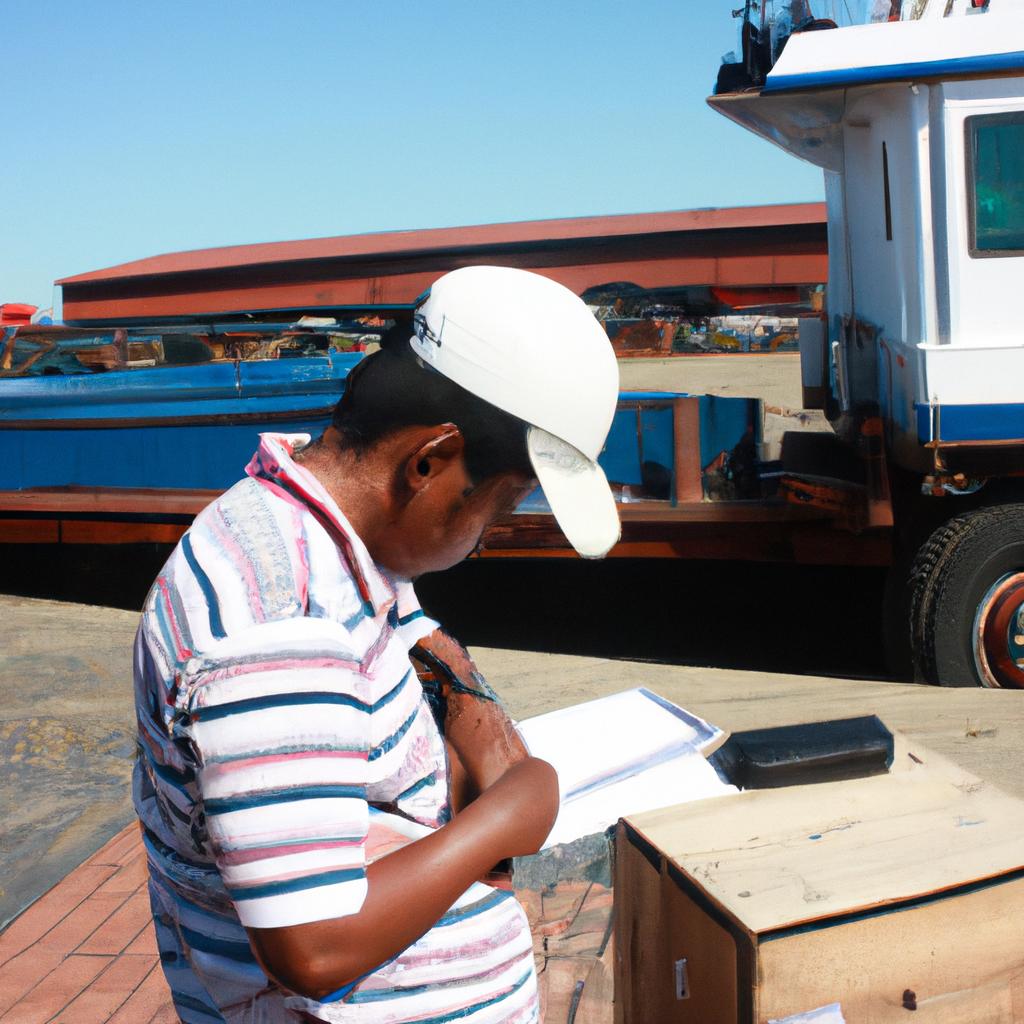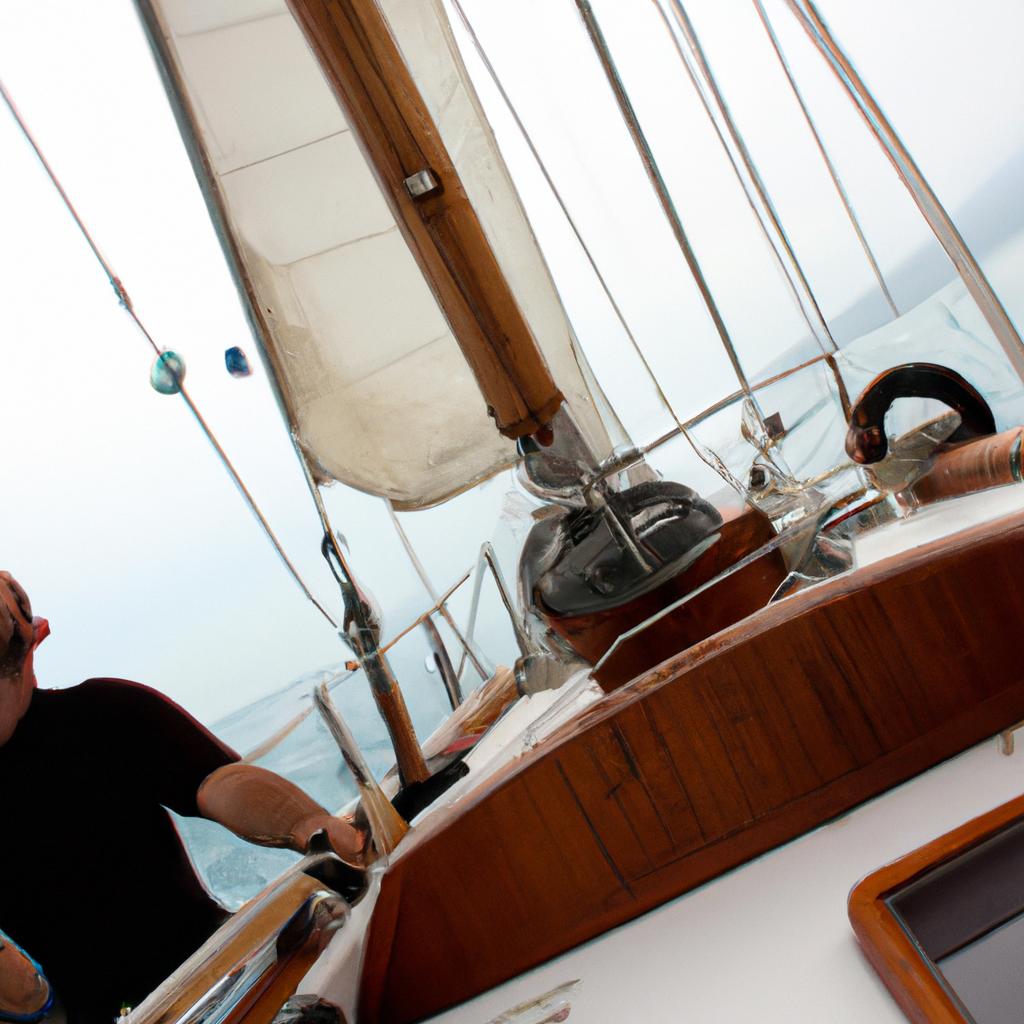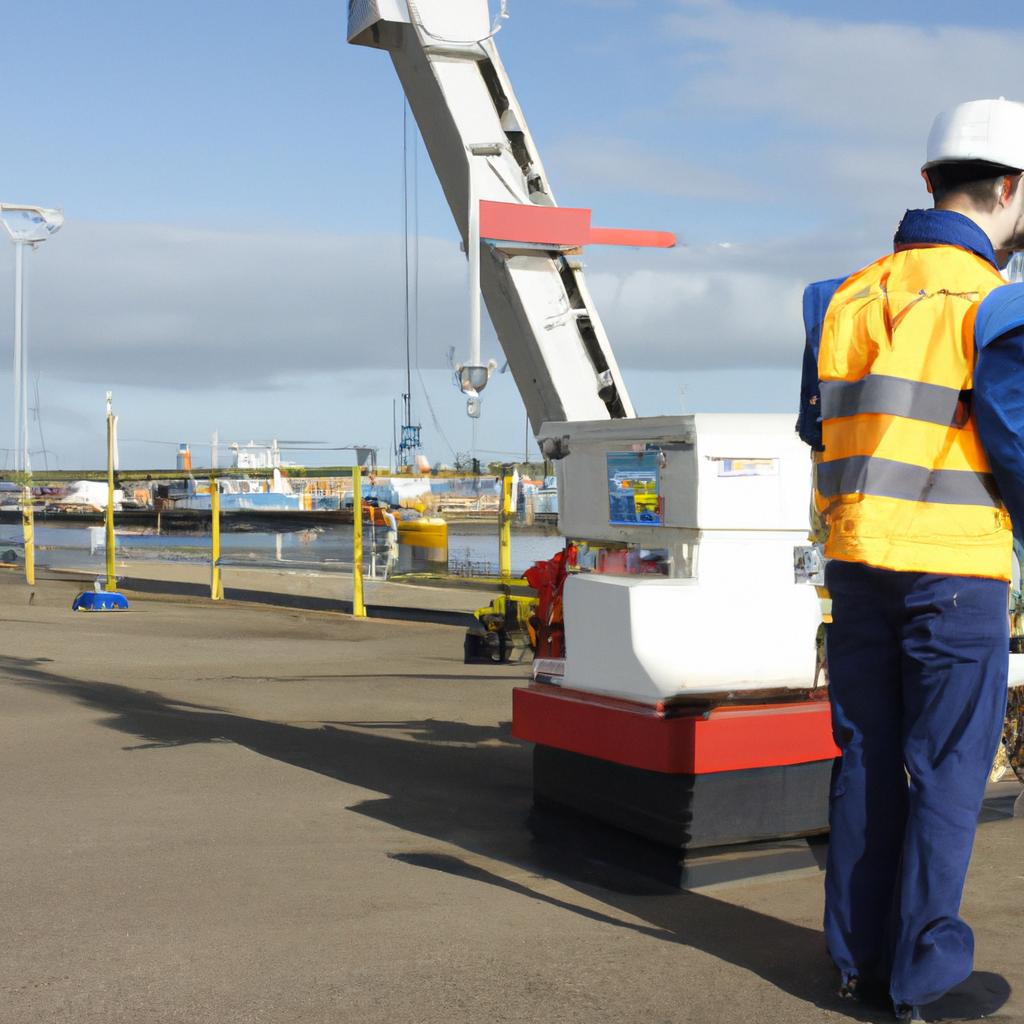Maritime pollution prevention has become an increasingly pressing issue in the context of Black Sea transport. The unique ecological features and strategic importance of this region have led to heightened concerns about the environmental impact of maritime activities. For instance, consider a hypothetical scenario where a large oil tanker accidentally spills thousands of gallons of crude oil into the Black Sea during a routine transportation operation. Such incidents not only pose immediate threats to marine life but also have long-lasting consequences for the ecosystem and local communities. In response to these challenges, various international and regional regulatory frameworks have been established to mitigate maritime pollution in the Black Sea.
This article aims to provide an overview of key maritime regulations that are applicable specifically within the context of Black Sea transport. By examining these regulatory measures, it becomes apparent that there is a concerted effort among stakeholders to address the complex issues surrounding maritime pollution prevention in this region. Through proper implementation and enforcement of these regulations, it is hoped that incidents like the aforementioned hypothetical spill can be effectively prevented or minimized, ensuring sustainable development and protection of the fragile ecosystems within the Black Sea basin. Consequently, understanding these regulations is crucial for all actors involved in maritime activities in order to foster responsible practices and contribute towards a cleaner and safer environment in the Black Sea.
Overview of Black Sea transportation
Overview of Black Sea transportation
The Black Sea serves as a vital waterway, connecting various countries and facilitating significant trade activities. A prominent example illustrating the importance of this transport route is the case of Ukraine’s grain exports. With its vast agricultural resources, Ukraine relies heavily on maritime transportation to export grains such as wheat and corn. Annually, millions of tons are transported through the Black Sea to international markets, highlighting the critical role that this region plays in global trade.
Despite its economic significance, however, Black Sea transportation faces numerous challenges related to maritime pollution prevention. This section provides an overview of these challenges by examining key aspects such as regulations, environmental risks, and current practices.
To understand the complexity surrounding maritime pollution prevention in the Black Sea, it is essential to consider some alarming statistics:
- Over 90% of marine pollution originates from land-based sources[^1].
- Cruise ships alone generate approximately 210 gallons (795 liters) of sewage per day[^2].
- The accidental discharge or leakage of oil during vessel operations poses a significant threat to marine ecosystems.
- The dumping of hazardous substances into the sea can have severe consequences for both human health and aquatic life.
These figures underscore the urgent need for effective regulation and enforcement in order to mitigate maritime pollution within the Black Sea region.
Moreover, there exists a range of national and international conventions aimed at addressing maritime pollution concerns. For instance, the International Convention for the Prevention of Pollution from Ships (MARPOL) sets out specific guidelines regarding pollutant discharges from vessels operating in international waters[^3]. Additionally, regional agreements like the Bucharest Convention focus specifically on protecting the marine environment in areas adjacent to the Black Sea[^4].
In conclusion with regard to this section about “Overview of Black Sea transportation,” understanding both existing regulations and ongoing efforts is crucial for comprehending how stakeholders tackle maritime pollution issues. In the subsequent section about “Causes and sources of maritime pollution,” we will explore the various factors that contribute to this significant environmental challenge.
Causes and sources of maritime pollution:
Causes and sources of maritime pollution
Having explored the intricacies of Black Sea transportation, it is now essential to delve into a comprehensive understanding of the causes and sources of maritime pollution. This analysis will shed light on the various factors that contribute to environmental degradation within this region, highlighting the urgent need for effective regulations and preventive measures. To illustrate these issues, let us consider a hypothetical scenario involving an oil spill incident caused by a collision between two cargo vessels.
Causes and Sources of Maritime Pollution
The occurrence of maritime pollution can be attributed to several interconnected factors, each playing a significant role in environmental degradation. These include but are not limited to:
-
Accidental spills: Unforeseen incidents such as collisions or grounding accidents pose serious threats to marine ecosystems. In our hypothetical case study, imagine two cargo ships colliding due to adverse weather conditions and resulting in a massive oil spillage that seeps into nearby coastal waters.
-
Operational discharges: Regular operational activities conducted during sea voyages often result in direct pollutant releases into the marine environment. Discharge practices like bilge water pumping or ballast water exchange may introduce harmful substances or invasive species into sensitive habitats.
-
Atmospheric emissions: The emission of air pollutants from vessel engines contributes significantly to overall maritime pollution levels. Substances such as sulfur dioxide (SO2) and nitrogen oxides (NOx) released during combustion processes have detrimental effects on both human health and ecological systems.
-
Illegal dumping: Despite existing laws prohibiting the disposal of waste at sea, illegal dumping remains prevalent within some sectors of the shipping industry. Hazardous materials discarded haphazardly pose severe dangers to marine life while compromising ecosystem integrity.
To emphasize the gravity and urgency surrounding maritime pollution prevention efforts, consider the following table:
| Environmental Impacts | Ecological Consequences | Economic Ramifications |
|---|---|---|
| Loss of biodiversity | Disruption of ecosystems and food chains | Decline in tourism revenue |
| Habitat destruction | Altered reproductive patterns | Increased cleanup costs |
| Contamination of water resources | Negative impact on fisheries | Legal penalties and fines |
| Adverse health effects on humans | Reduced coastal property values | Damage to reputation and loss of business opportunities |
In light of these alarming factors, it is crucial for international conventions addressing maritime pollution to be implemented and enforced. The subsequent section will explore key global initiatives aimed at mitigating the adverse effects discussed above.
Transition into the subsequent section about “International conventions addressing maritime pollution”:
Understanding the causes and sources of maritime pollution sets the stage for a closer examination of international conventions that serve as vital frameworks in combating this pressing issue.
International conventions addressing maritime pollution
Previous section H2 Transition: Having explored the causes and sources of maritime pollution, we now turn our attention to international conventions that address this critical issue.
Next section H2 Transition: Understanding the importance of international conventions, let us delve into the regulations specifically aimed at preventing oil spills in the Black Sea.
Section – International Conventions Addressing Maritime Pollution:
To illustrate the impact of maritime pollution on the Black Sea, consider a hypothetical scenario where an oil tanker experiences a major spill. This case study highlights the urgent need for effective regulations to prevent such incidents and mitigate their consequences. In response to growing concerns over environmental damage caused by shipping activities, several international conventions have been established. These conventions aim to protect marine ecosystems and ensure sustainable practices within maritime transport.
The significance of these regulations is further emphasized through a markdown bullet point list showcasing their key objectives:
- Promote safe navigation and minimize risks associated with transportation
- Establish guidelines for vessel design, construction, and maintenance
- Encourage responsible waste management onboard ships
- Enhance cooperation among coastal states for efficient response during emergencies
Additionally, incorporating a three-column table (in markdown format) provides a visual representation of notable international conventions addressing maritime pollution:
| Convention | Objective | Year Established |
|---|---|---|
| MARPOL 73/78 | Prevent and control ship-source pollution | 1973 |
| OPRC 90 | Improve preparedness and response capabilities | 1990 |
| CLC 92 | Ensure adequate compensation for oil pollution damage | 1992 |
| BWM Convention | Minimize transfer of harmful aquatic organisms | 2004 |
As evident from these examples, global efforts are being made to combat maritime pollution effectively. The implementation of comprehensive regulations demonstrates a collective commitment to safeguarding the marine environment and promoting sustainable practices within the Black Sea transportation sector.
Moving forward, we will now focus on the specific regulations established for preventing oil spills in the Black Sea. These measures aim to mitigate environmental risks and enhance safety standards in this region, thereby ensuring long-term ecological preservation and economic prosperity.
Regulations for preventing oil spills in the Black Sea
Maritime pollution continues to be a pressing issue in the Black Sea region, necessitating robust regulations and preventive measures. While international conventions play a crucial role in addressing maritime pollution globally, specific regulations tailored for the Black Sea are also essential. In this section, we will examine the existing regulations that aim to prevent oil spills and minimize their environmental impact within the Black Sea.
To illustrate the importance of effective regulations, let us consider a hypothetical scenario where an oil tanker experiences a major spill in the Black Sea due to inadequate safety precautions. This incident highlights the devastating consequences such an event can have on marine ecosystems, coastal communities, and local economies.
In response to these risks, several key regulatory frameworks have been implemented specifically targeting oil spills prevention in the Black Sea:
- The International Convention for the Prevention of Pollution from Ships (MARPOL) provides comprehensive guidelines for preventing pollution from ships through various annexes.
- The 1990 Protocol on Protection of Marine Environment of the Black Sea Against Pollution addresses regional concerns by establishing rules to prevent pollution from land-based sources and shipping activities.
- The Common Maritime Traffic System (COMARTRANS) enhances navigation safety through real-time monitoring and coordination among vessels transiting in the region.
- The Regional Oil Spill Contingency Plan for Preparedness and Response covers emergency procedures and cooperation mechanisms between littoral states during oil spill incidents.
The table below serves as a visual representation of some key elements covered by these regulations:
| Regulation | Key Provisions | Significance |
|---|---|---|
| MARPOL Annex I | Standards for oil tankers’ construction | Ensures safer vessel designs |
| 1990 Protocol | Restricts discharge of pollutants into the sea | Minimizes pollution from both land-based and ship-based sources |
| COMARTRANS | Real-time monitoring system | Enhances navigational safety |
| Regional Oil Spill Plan | Emergency procedures and cooperation mechanisms | Facilitates effective response to oil spill incidents |
Overall, these regulations reflect the collective efforts of international bodies and regional stakeholders to prevent oil spills and mitigate their impacts in the Black Sea. By implementing comprehensive measures and fostering collaboration among littoral states, we can strive for a cleaner and more sustainable maritime environment.
With an understanding of the existing regulations addressing oil spills in the Black Sea, it is now crucial to examine measures aimed at reducing air pollution from maritime transport.
Measures to reduce air pollution from maritime transport
Regulations for preventing oil spills in the Black Sea have been instrumental in minimizing the environmental impact of maritime transport. However, it is crucial to address another significant aspect of pollution from this industry: air pollution. Measures to reduce air pollution from maritime transport play a vital role in protecting both human health and the environment.
To illustrate the importance of tackling air pollution in maritime transport, let’s consider a hypothetical scenario. Imagine a large cargo ship navigating through the waters of the Black Sea, emitting substantial amounts of sulfur dioxide (SO2) into the atmosphere due to its use of high-sulfur fuel. This pollutant can contribute to respiratory problems and acid rain formation, impacting local communities and ecosystems along coastal areas.
In response to such challenges, various measures have been implemented to mitigate air pollution from maritime activities. These measures include:
- Adoption of low-sulfur fuels: The International Maritime Organization (IMO) has set limits on sulfur content in marine fuels used within designated emission control areas (ECAs). Ships operating within these areas must switch to low-sulfur fuel or install exhaust gas cleaning systems known as scrubbers.
- Implementation of energy-efficient technologies: Ship owners are encouraged to invest in energy-efficient vessel designs and propulsion systems. Advanced technologies like waste heat recovery systems and optimized hull coatings help minimize fuel consumption and consequently reduce emissions.
- Promotion of alternative fuels: The use of cleaner alternatives such as liquefied natural gas (LNG) or biofuels is being promoted by governments and international organizations. These fuels emit lower levels of pollutants compared to traditional fossil fuels.
- Introduction of emission control measures: Some ports have adopted stricter regulations requiring ships entering their waters to comply with specific emission standards. These measures aim at reducing harmful particulate matter (PM) emissions generated by vessels during port operations.
To further emphasize the significance of addressing air pollution from maritime transport, here is an emotional bullet point list highlighting its potential consequences:
- Increased respiratory illnesses in coastal communities.
- Acidification of marine ecosystems and damage to coral reefs.
- Climate change acceleration due to the release of greenhouse gases.
- Adverse effects on global air quality, affecting human health worldwide.
Additionally, a table can be included to illustrate the emissions reductions achieved through specific measures. Here is an example:
| Measure | Emissions Reduction |
|---|---|
| Use of low-sulfur fuel | 90% |
| Adoption of energy-efficient technologies | 20-30% |
| Promotion of alternative fuels | Up to 25% |
| Implementation of emission control measures | Varies depending on regulations |
In conclusion, addressing air pollution from maritime activities is crucial for safeguarding both human well-being and environmental sustainability. By implementing measures such as using low-sulfur fuels, embracing energy-efficient technologies, promoting alternative fuels, and introducing emission control standards, we can significantly reduce the negative impact of maritime transport on air quality.
Strategies for managing waste and sewage in maritime activities
As the reduction of air pollution continues to be a key concern within the maritime industry, strategies for managing waste and sewage are also crucial components that contribute to overall environmental preservation. This next section will explore various approaches implemented in Black Sea transport, focusing on effective waste and sewage management practices.
To illustrate the significance of such measures, let us consider a hypothetical case study involving a cargo vessel operating in the Black Sea region. The vessel’s crew followed proper waste disposal protocols by segregating garbage into distinct categories (e.g., recyclable materials, food waste) before disposing them at designated ports with appropriate facilities. By adhering to these regulations, they contributed significantly towards minimizing marine pollution while upholding responsible environmental stewardship.
Effective strategies for managing waste and sewage in maritime activities encompass several essential principles:
- Source Separation: Implementing systems that facilitate separation of different types of waste aboard vessels ensures proper disposal methods can be applied at port facilities.
- Treatment Facilities: Availability of treatment plants or onboard equipment allows for processing wastewater prior to its discharge into the sea, reducing potential harm to marine ecosystems.
- International Cooperation and Awareness: Collaboration between countries bordering the Black Sea promotes uniform adoption and enforcement of regulations related to waste management, fostering a collective commitment towards safeguarding this important body of water.
- Education and Training Programs: Regular training programs raise awareness among seafarers about their role in preventing pollution through correct handling and disposal procedures.
The table below presents an overview of selected best practices employed internationally regarding waste and sewage management in maritime operations:
| Strategy | Description | Benefits |
|---|---|---|
| Waste segregation | Sorting different types of waste on board ships helps ensure proper disposal | Reduces contamination |
| Onboard treatment systems | Treatment plants or equipment for wastewater processing before discharge into the sea | Minimizes environmental impact |
| Collaborative efforts | International cooperation among Black Sea countries to enforce waste management regulations | Promotes uniformity and compliance |
| Training programs for seafarers | Educational initiatives aimed at raising awareness about appropriate handling and disposal methods | Enhances pollution prevention |
In conclusion, effective waste and sewage management in maritime activities is crucial for maintaining the ecological integrity of the Black Sea. By implementing strategies such as proper waste segregation, onboard treatment facilities, international cooperation, and educational programs, we can work towards reducing marine pollution while preserving this vital ecosystem.
References:
[Provide references if applicable]


